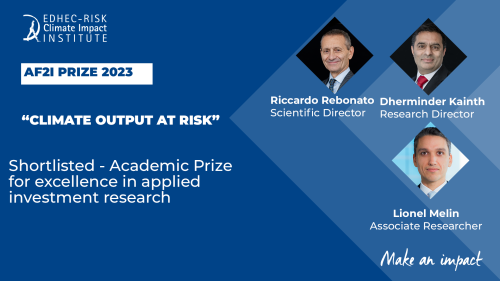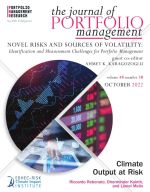
"Climate Output at Risk" Distinguished by the French Association of Institutional Investors
Written on 05 Feb 2024.

The French Association of Institutional Investors (Af2i) unveiled the winner and runners-up of its yearly Academic Prize for excellence in applied investment research.
"Climate Output at Risk" by EDHEC-Risk Climate Impact Institute Professor Riccardo Rebonato, Dr. Dherminder Kainth, and Dr. Lionel Melin, was amongst three articles shortlisted by the association's research commission, chaired by its honorary president, renowned institutional asset management and fixed income expert Dr. Jean-François Boulier.
About the Af2i Academic Prize 2023
A vote of the association's members and partners determined the winner article “Integrating Private Equity in a Liquid Multi-Asset Portfolio”, by Vanguard Global Head of Portfolio Construction Dr Roger Aliaga-Diaz and co-authors.
The other runner-up article was authored by Dr. Philip Hodges, Chief Investment Officer of BlackRock Factors, Sustainable and Solutions Group, along with co-authors. The article explores the incorporation of European Union Paris-aligned Benchmark minimum standards into multi-asset portfolios.
The articles eligible for the award were those published in 2022 in the following scientific journals: Finance, Bankers Markets and Investors, The Journal of Portfolio Management, Journal of Financial Stability and Financial Analyst Journal.
About Climate Output at Risk
Published in the 2022 Special Issue on Novel Risks and Sources of Volatility of The Journal of Portfolio Management
Investors and regulators are increasingly concerned that climate changes, tipping points in particular, pose serious risks for future economic growth. The authors extend a leading integrated assessment model to incorporate the latest physics and economics findings to study the impact of three emission abatement schedules (BAU, SLOW, and FAST) on economic output over the next 150 years. The authors find that abating little means betting that tipping points do not exist, or that their threshold temperatures are many degrees above current temperatures.
Key findings:
- The reduction in aggregate economic output due to climate damage strongly depends on the existence and location of tipping points, and the distribution of output losses is very strongly skewed toward large losses.
- A fast abatement schedule effectively insures in most scenarios against losses in output due to tipping points; a slow abatement schedule is far less effective in doing so.
- The “cost of insurance” is small: Fast decarbonization delivers considerable benefits in most climate scenarios, and even in the most climate-benign scenarios, only marginally reduces output.
Complimentary access to the published article is provided for a limited time


